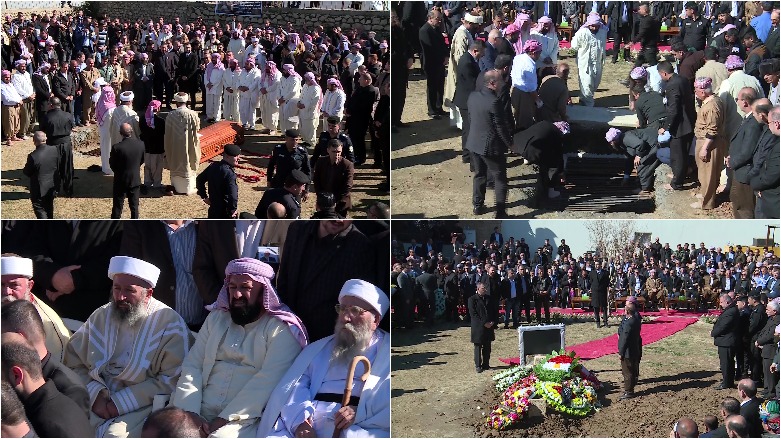Body of late Yezidi leader laid to rest at Kurdistan home

ERBIL (Kurdistan 24) – The body of Yezidi (Ezidi) religious minority leader Mir Tahseen Beg was laid to rest during a ceremonial burial on Tuesday in his hometown of Shekhan, located in the Kurdistan Region's province of Duhok.
Beg passed away at the age of 86 on Jan. 28 in the German city of Hanover after a lengthy battle with illness and was repatriated to the Kurdistan Region on Monday.
Today, Beg’s body arrived in Shekhan, finishing its journey at a funeral attended by hundreds of locals, members of the Ezidi community, and various officials and dignitaries.
Ezidis recited prayers and carried out ritual ceremonies as the leader’s coffin was lowered to its grave as part of a special area dedicated to that purpose at his home. Representatives of different groups, local leaders, and missions laid wreaths on the tomb.
During Monday's repatriation event at the Erbil International Airport, outgoing Kurdistan Regional Government (KRG) Prime Minister Nechirvan Barzani delivered a speech, stating that the ethnoreligious group should play a larger role in governing themselves.
This ceremony was also attended by local and regional officials as well as foreign envoys.
The “administration of their [Ezidi] areas should reflect their unique situation,” suggesting Shingal should become a governorate of its own. “In the Kurdistan Region and Baghdad, we will take serious steps in this regard.”
The emergence of the Islamic State and its violent assault on Shingal in 2014 led to the displacement of hundreds of thousands of Ezidis. Most of them fled to the Kurdistan Region, while others resettled in neighboring countries in the region or in Western states.
Others were not as lucky and remained stranded in the war zone, where they experienced atrocities and mass executions at the hands of the extremist group for years. Militants subjected women and girls to sexual slavery, kidnapped children, forced religious conversions, executed scores of men, and abused, sold, and trafficked women across areas they controlled in Iraq and Syria.
Prior to the 2014 attack, there were roughly 550,000 Ezidis in the Kurdistan Region and Iraq. As the jihadist group took over large swaths of territory in Nineveh Province, 360,000 Ezidis escaped and found refuge elsewhere, according to the KRG’s Ezidi Rescue Office.
So far, 69 mass graves which contain the remains of Ezidis have been excavated along with untold numbers of individual graves.
The Kurdish and Ezidi Peshmerga forces, with the support of the US-led coalition, liberated Shingal from the Islamic State in Nov. 2015, but the town remains a ghost-town, with little to no basic services available.
Shingal, part of territories disputed Erbil and Baghdad, is currently under the control of Iraqi forces and Shia militias. These forces, plus a limited number of Peshmerga and other Kurdish fighters are present in Shingal and its outskirts, with reports of tensions between over which will control the strategic town that lies near the Syrian border.
Editing by John J. Catherine
